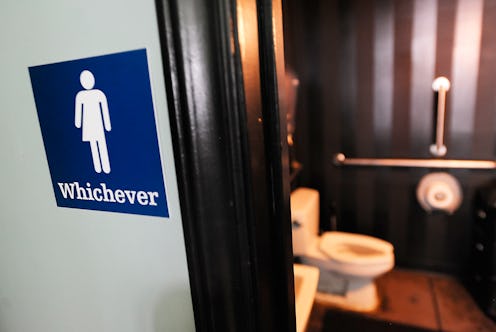News
This HB2 Bill Update Is Hopeful
Update 1: The HB2 repeal failed on Wednesday, Dec. 21. Democrats were expecting to pass a clean repeal bill, but GOP Sen. Phil Berger instead offered a repeal that would leave HB2 in place for an additional six months before it was officially repealed.
Update 2: Berger, North Carolina's Republican Senate Leader, officially introduced the bill to repeal HB2 on Dec. 21. However, if it is repealed, there would be a six-month waiting period before local governments started "regulating employment practices or regulating public accommodations or access to restrooms, showers, or changing facilities."
Earlier: Among chants of "Y'all means all" and "No hate in my state," the North Carolina House is on the brink of repealing HB2. The law, passed in March under a Republican governor and legislature, overturned a Charlotte nondiscrimination ordinance which included provisions which guaranteed transgender citizens the right to use the bathroom of their choice in private businesses, regardless of the gender stated on their ID. HB2 superseded that and mandated that people use the restroom which matched their birth certificates. Now, this HB2 bathroom bill repeal update shows there's hope that the state's discriminatory law will be reversed after all.
This is not yet a done deal, and it's not great news — more like one step forward, one step back, considering the terms negotiated by the Republican legislature and outgoing Republican Gov. Pat McCrory (he lost his reelection bid at least in part due to his support of HB2). The Republicans made clear that the repeal of HB2 was only on the table if Charlotte repealed its nondiscrimination law. That means that while transgender North Carolinians will have the right to use public bathrooms of their choice, they will not be protected in Charlotte when using restrooms in restaurants, hotels, or other public accommodations.
And it gets worse. The classes of "marital and familial status, sexual orientation, gender expression and gender identity" were added to the existing nondiscrimination ordinance this year. That's all been undone. That means transgender residents of Charlotte won't receive protections in taxicabs or in any business in the city. They're not guaranteed the right to use the bathroom, but it's even worse. They're not even guaranteed to be served at a bar or restaurant. All those protections were undone.
Of course, that is already the case in the rest of North Carolina, and HB2 superseded the entire nondiscrimination clause, so the legal situation on the ground will not have changed. But that's still a big ask from the legislature. They'll only consider reversing course if there are no legal protections for LGBT people in the state.
At first, LGBTQ groups, as well as Charlotte's mayor, refused to repeal the city's ordinance, but they since came around and did so on Monday. Even that wasn't good enough, though. On Tuesday, the Republicans claimed it was not a full repeal, which required the city council to re-repeal the ordinance Wednesday morning. "If the General Assembly needs us to consider doing more, we ask for a clear explanation of what that entails,” a Republican council member offered. The legislature has thus gotten everything they've asked for.
Now it will depend on that same legislature finding enough votes for the repeal. There's no guarantee they'll find them, given the holiday season and that this is a special session. One of the most interesting things to watch has been the change of heart by Gov. McCrory. As late as September, he vowed that he still supported the law — despite the millions of dollars it had cost the state. All it took him to reconsider was losing his reelection bid. Perhaps he thought changing course on it would cost him some Trump voters. But given that Trump won North Carolina and McCrory lost, that seems to be the opposite of what happened.
In any case, for now the fate rests in the North Carolina legislature and the Republicans' ability to do the right thing for their transgender constituents and the state. If you're a North Carolina voter, call your legislators and let them know how you feel about the issue.
